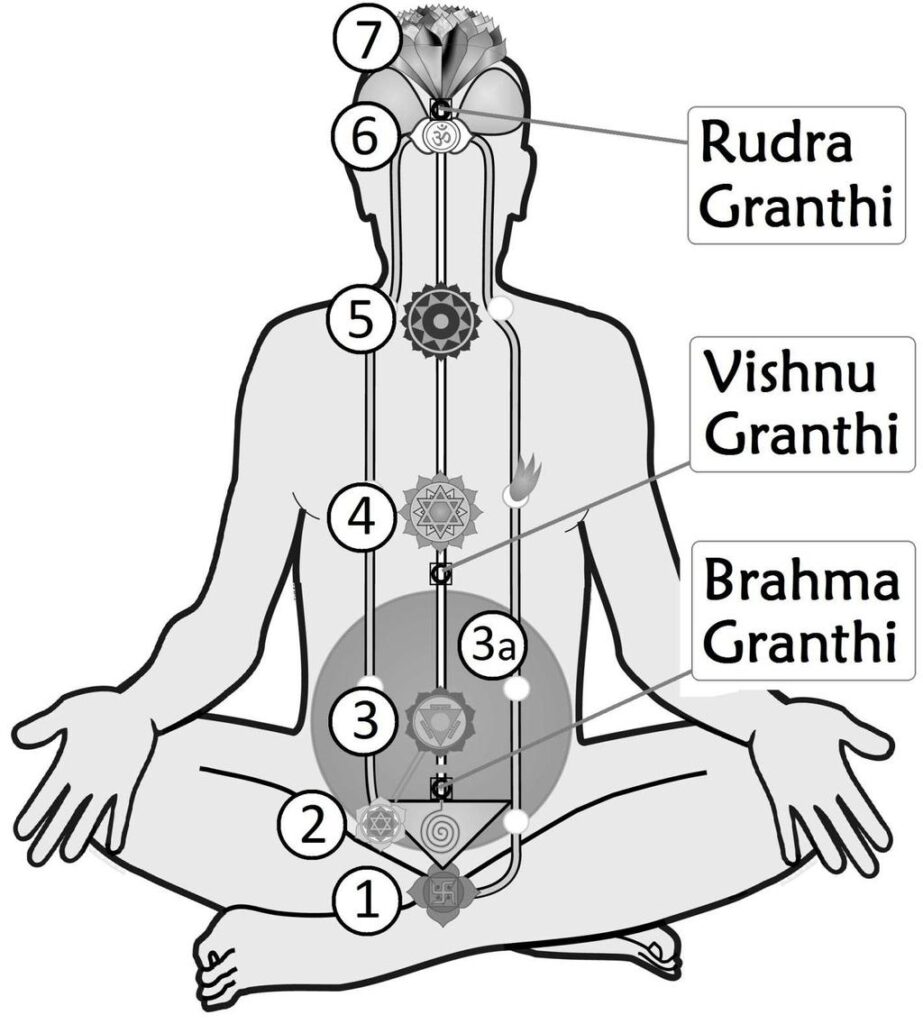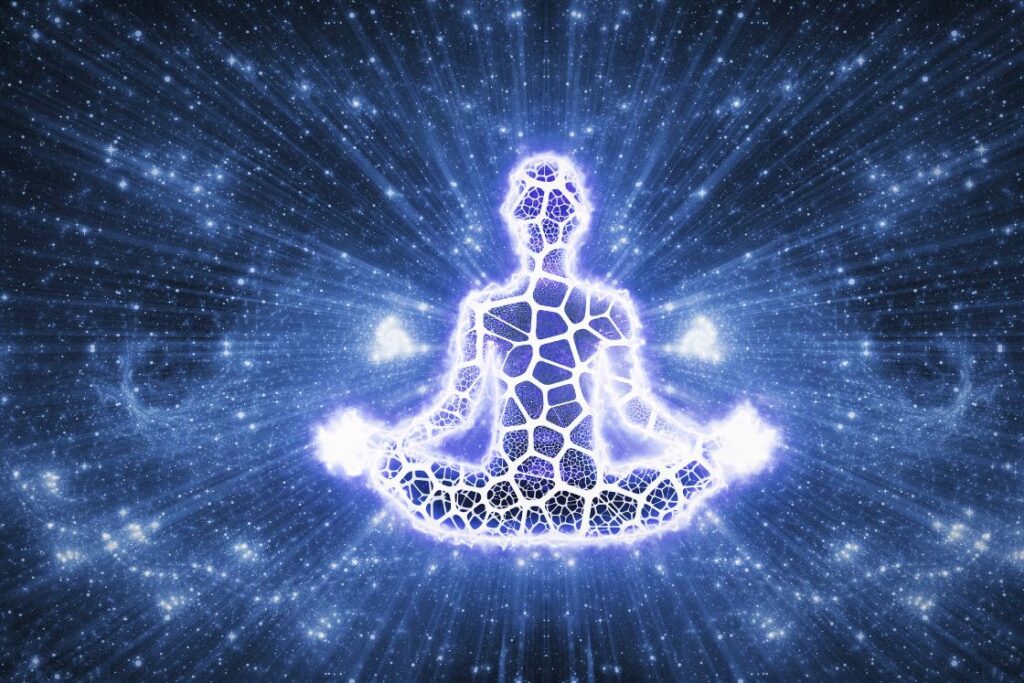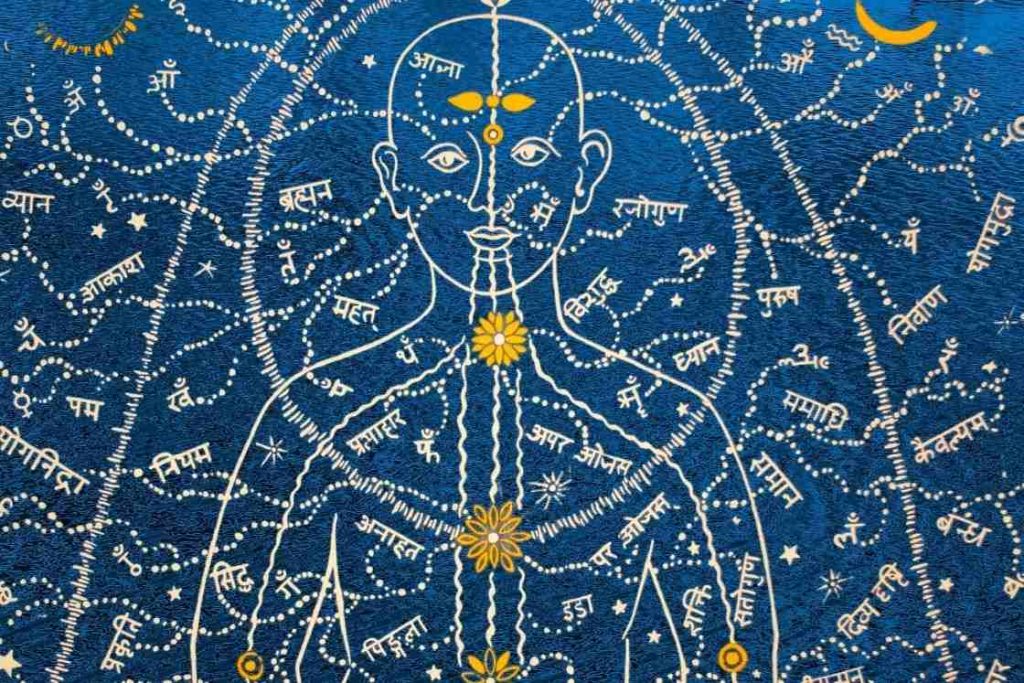
For people seeking enlightenment or those who want to achieve the state of full consciousness, kundalini awakening is one of the most sought-after experiences.
Kundalini awakening is a state wherein your serpent kundalini shakti, which lies at the base of your spine, rises from its origin to travel to the crown chakra or the top of your head. This journey involves a ton of physical, mental, and spiritual changes.
While you may have heard a lot about the signs of kundalini awakening and the duration of these symptoms, you might also be interested to know about the stages of kundalini awakening.
Each stage comes with a distinct change in your energetic plane which manifests physically and mentally.
Let us see these stages in detail.
Before we dwell into the stages, let us first understand one of the concepts that pose a hindrance to the free flow of energy – granthis.
What are Granthis?

The Sanskrit term granthi means knot, node, or doubt. It also means a difficult knot to untie.
Granthis or knots are energy tangles that could obstruct the body’s ability to move Prana. Granthis may be to blame for obstructing the Sushumna Nadi’s ability to carry prana upward, according to kundalini yoga.
This limits spiritual growth and prevents one from realizing their greatest potential. They serve as obstacles to liberation, both material and spiritual.
Just like bandhas (locks), there are 3 main granthis:
Brahma Granthi – Also known as the “perineal-knot,” it is situated between the root chakra and the sacral chakra. It is linked to a lack of stability and anchoring, as well as a fear of death and is caused by the anxiety of survival. You can untie this granthi through Mula Bandha (root lock).
Vishnu Granthi – Also called “navel-knot”, it lies between the heart and throat chakra. The undoing of this knot represents letting go of ego and attachment to the material things in life. Holding on to the ego and being obsessed with obtaining power and influence are the causes of this granthi. You can untie this granthi through Uddiyana Bandha (upper abdominal lock).
Rudra Granthi – Also called “forehead-knot”, it is situated between the throat and the third-eye chakra. It may become apparent when we become preoccupied with serving others and neglect our aspiration to experience unity with all living things and ultimately surpass separation. You can untie this granthi through Jalandhara Bandha (throat lock).
Now that we have a brief understanding of the granthis, let us now look into the 3 stages of kundalini awakening.
3 Stages of Kundalini Awakening
The kundalini awakening process has been classified into 3 stages; Arambha or Beginning, Ghata or Cleansing and bodhi or awakening. The stages have been categorized basis the work your kundalini yoga, meditation, kriya, and mantra perform to make the kundalini rise.
Stage 1 – Arambha or The Beginning

In the first stage, the kundalini is uncoiling from its slumber at the Muladhara chakra or its resting place at the base of the spine.
The first stage is often seen as a preparatory phase for more intense experiences to come. The stage of a clearing process is where the body and mind must go.
By practising chanting, Kundalini Yoga, and kriya, your body’s energy vibrates at a frequency that helps in cleansing the root chakra and untying the Brahma Granthi. It is only when root chakra and Brahma granthi are cleansed, the kundalini can properly rise and ascend.
Physical sickness, discomfort, and strong emotions are likely to be present throughout this initial stage. The root chakra is the focus of energy movement in the first stage of kundalini awakening. As an imbalanced root chakra is associated with issues of safety, security, and grounding, so, the opening and activation of this chakra can bring up feelings of emotional intensity, vulnerability, or even fear.
Numerous negative situations and emotions including depression, anxiety, frustration, helplessness, rampant muscle twitching, trauma, or a near-death experience, are frequent during the first stage.
The initial stages of a Kundalini awakening are frequently described by yogis as being depressing, anxious, and helpless making it the least pleasant stage of kundalini awakening.
Stage 2 – Ghata or the Cleansing

Ghata means elimination, thus, in the second stage of kundalini awakening, you are cleansing the sacral and solar plexus chakra through further purification of Sushumna Nadi. This is the central Nadi out of the three nadis – Ida, Pingala, and Sushumna, through which the kundalini energy passes.
The cleansing of Sushumna becomes important to secure an unobstructed and free flow to the kundalini energy.
During the second stage of kundalini awakening, you begin to question your existence and purpose in life. You will start to debate everything you have been taught to believe.
This further encourages you to look inwards and see how your negative actions and behavior were impacting yourself and the environment around you. It will push you to change your behaviour and thought patterns to stop this cycle of negativity.
You will be able to let go of anything that has been holding you back and hindering your journey toward spirituality. Your relationship with the divine may get stronger as you become less concerned with your outward looks. As result, you also lose the fear of death.
It is also in this stage that you might feel the energy flowing in and around the top of the head. And any energy that wasn’t yet released in the first stage also gets cleared and unblocked.
Through this cleansing, you are also propelled to undo the Vishnu Granthi or Vishnu Knot, which lies between the heart and throat chakra. The undoing of this knot represents letting go of ego and attachment to the material things in life.
Stage 3 – Third-eye Awakening

Related: 8 ways to open third eye chakra
This is the second last stage before your kundalini reaches the Sahasrara chakra to attain full consciousness.
This stage can only be achieved if you apply all that you have learned with patience and proceed to untie the Rudra Knot. It will help the kundalini to further rise for the final phase of awakening.
When the Rudra knot comes undone, you will feel a tingling in your third eye signifying the untying. All sense of duality vanishes and you become one with the cosmos.
The kundalini is free to rise to the final chakra through all the 3 Nadis – Ida, Pingala, and Sushumna.
By now, all your chakras have been cleansed and the pineal gland or your third eye is waiting to be opened. You will experience a blissful feeling and will attain complete mental clarity. Surrendering to the Universe and accepting its path laid out for you becomes much easier.
You would have understood the truth of the existence of each living being and this will subsequently bring about a change in your character and personality. No negative talk, criticism, or a feeling of controlling your surroundings will exist within you.
You’ll have a sense of unity with your inner essence while your brain will work at higher frequencies (between alpha and beta frequencies). This will help you to stay in a deep meditative state while also experiencing enhanced extra-sensory abilities.
Does kundalini awakening make you tired?
Yes, it can make you tired.
One of the signs of kundalini awakening is the disruption of the usual sleeping pattern. The reason for this change is the fact a lot of sudden shifts and transformation is happening in the energetic plane of your body. Your beliefs are being questioned, your traumatic memories are coming forward, and a lot of mental and physical pressure is being inadvertently placed on you.
As you navigate through these adjustments, it sometimes takes a toll on your body and mind and brings you to a state of fatigue or burnout.
To overcome this, you should seek out professional guidance, even though it is rare to find a master who has undergone a proper kundalini awakening. You will need to make some adjustments and sacrifices in life, take adequate rest, and build the strength to endure this process.
How rare is Kundalini Awakening?
The answer to this question can be understood by the fact that the third stage is the most difficult stage to attain as most pursuers of kundalini awakening tend to lose patience after the first or the second stage.
Kundalini awakening is quite a rare occurrence in the common world. This is because most of the time, we are unable to follow the guidelines and rules of Yoga in its true sense. We are more into short-term solutions to problems like stress, anxiety, weight gain, muscle toning, mental peace, etc.
But the people of the spiritual world, whose sole aim is to achieve enlightenment and have set their intention towards kundalini awakening may find it a regular occurrence. They have developed resilience, knowledge, and patience, and cleansed and activated their chakras to fulfill their goal.
Moreover, kundalini awakening can occur spontaneously and at any point in life. This is also another reason kundalini awakening is rare; people lose hope and faith in the practice when they start setting deadlines and expectations in the awakening process.
Is Kundalini Awakening permanent?
Yes. Kundalini awakening, when done under proper guidance and through proper channels, is an irreversible process.
The awakened energy will keep flowing throughout your body, calling you towards your true purpose in life and changing your life forever.
It can be temporary if you have awakened the kundalini through quick means such as shaktipath. This fast-tracks the awakening process by providing a glimpse of the real awakening for a short period. However, this method is not popularly advisable as the body and internal energy sources should be fully ready to experience the temporary awakening.
Experience Kundalini Mastery: Join Our 200-Hour Kundalini Yoga Training
Conclusion
When your kundalini awakens is not something to worry about. If you wish to raise your Kundalini, you should put all of your attention on releasing your prana from its incessant anxieties about the external world.
Because this journey calls for the uttermost faith in the Divine, patience is crucial. Embrace the transformational adventure of self-discovery.







